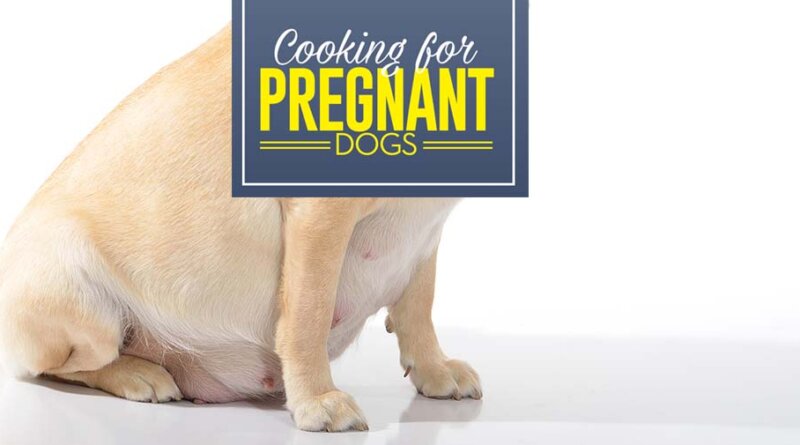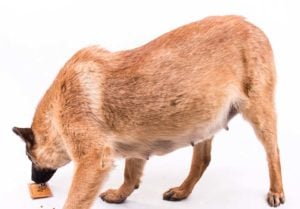What to Feed a Pregnant Dog and What to Feed a Nursing Dog
Pregnant dogs require a lot of care and attention.
One of the most crucial aspects to focus on is your pregnant dog’s diet. But what to feed a pregnant dog, and then what to feed a nursing dog?
Knowing this and what foods to include in the diet during the gestation period and after the birth can help your dog have a full and healthy litter.
Prepare for Dog Pregnancy
Preparing for your dog’s pregnancy involves more than simply knowing what nutritional requirements your dog needs.
Here’s a full dog pregnancy guide I would recommend you read.
In the end, if you want to breed your female dog, assessing her body condition in advance is important.
Physical demands that come with pregnancy and nursing can be hard for dogs who are not in perfect or at least good health.
Even if your dog is underweight or overweight, it can cause some problems in pregnancy.
Underweight dogs can have a problem with eating enough food to support the nutritional needs of their puppies and herself at the same time.
Overweight dogs can have difficult labor.
That is why a balanced diet fed in appropriate amounts is important before the breeding.
Get your dog in good shape for the pregnancy, and you can avoid many health issues.
We will go through what kind of diet a dog going through pregnancy needs.
We will also answer what you should feed them once they deliver the healthy puppies.
ALSO READ: How to Identify False Pregnancy in Dogs
What to Feed a Pregnant Dog
A diet for pregnant dogs needs to be nutritionally rich and feeding your dog properly during pregnancy can help you avoid problems like eclampsia (low blood calcium) or even smaller litters and a higher risk of puppy death.
The diet will determine if the dog’s pregnancy goes well and if she has healthy puppies.
Timing and amount of food will also differ.
Dietary Guidelines
Before you structure your pet’s diet, be aware of all the dog pregnancy stages.
The gestation period for dogs is 9 weeks and during that time, you will have to modify your dog’s diet depending on the week she’s in.
Dog food from a commercial brand will do just fine, but just make sure it is a high-quality diet.
Make sure she is eating food that has higher than normal soluble carbohydrates. Your dog’s food intake needs to provide adequate nutrition to prevent her blood sugar from dipping too low during pregnancy.
For the first 4 weeks, you can feed your dog the way you normally would with regular meals, without increasing the amount of food.
After that, by week 5, you should increase the amount of food in your pregnant dog’s diet by 20-30%.
She needs to consume enough calories to maintain adequate energy intake for both your mama dog and the puppies.
By week 6, her puppies will begin to grow and your dog’s stomach capacity will shrink.
That means that you need to start feeding her more often, in smaller amounts.
Three times a day should be the minimum, but you can also do it 4-5 times a day. However, you should also continue to gradually increase the amount of food given.
By week 8, pregnant dogs need around 50% more food than before their pregnancy.
She will need it in the coming weeks because the dog’s weight needs to be maintained since she will decrease food intake in the coming week.
A pregnant dog’s weight is crucial during the whelping period and during lactation for healthy milk production.
Due to incoming labor, in the last week of pregnancy, she will start refusing food and eating less.
Some bitches eat about 25% less than in the previous week and for the last couple of days, many of them will stop eating altogether.
You must always keep in mind what to feed a pregnant dog and the exact formulas or recipes you use. If you are feeding your pet commercial dog foods during pregnancy, look for highly digestible foods or even sensitive stomach dog foods.
This can help her get the most nutrition from her food with little risk.
Premium quality dog foods are particularly good for dogs in the last three weeks of pregnancy and after labor.
Know what to feed a nursing dog to sustain the mother’s milk production.
When the mama dog’s diet has proper nutrition, it increases her chances of a healthy delivery.
She will use those nutritional reserves that you’ve been feeding her, so the next few weeks of feeding weak puppies go smoothly.
Your pooch will lose weight after birth, but her nutritional needs will increase.
Depending on the size of the litter, nursing dogs might need 2-3 times their normal food requirements to sustain their pups.
You also need to make sure that your dog always has water at her disposal and that she drinks plenty of it since that can help her generate more milk to feed the litter.
Important Nutrients
It’s always best to discuss with your vet what you should feed your dog before you set up a diet.
But keep in mind that in different stages of her pregnancy, your dog will require different amounts of food; the nutrient needs will differ slightly.
If you’re making homemade dog food yourself instead of using commercial kibble, then focus on foods that your pooch prefers to ensure she continues eating enough.
Protein
Protein is a vital source of amino acids for your dog and that is important for her in order to support the healthy development of her puppies.
Try to feed your dog high-quality protein during pregnancy and nursing.
Best source of protein for dogs is meat, so focus on chicken, turkey, beef, lamb and fish (as long as she’s not allergic to any of these ingredients).
Eggs and dairy products are also good secondary sources of quality protein.
Fat
Higher demand for calories can be satisfied by increasing your dog’s fat intake. This should particularly be done by week 6 of gestation.
By that time, you should increase the intake of red meats with higher fat content, and decrease the intake of lean meat or white meat.
That means sticking to beef, lamb or pork would be the optimal choice.
Fatty Acids
Omega-3 fatty acids are very important for your dog because they aid the development of fetal brain and nerves.
They are also good for the eyesight.
The best sources of omega-3 acids are fish like salmon, but you can also include fish oil supplements in your dog’s diet.
Vitamins
Important vitamins for a pregnant dog include vitamin C, vitamin D and folate, which is also known as the B9 vitamin. Vitamin C can help aid the uptake of iron into your dog’s system, but it also helps with tissue building and can support the immune system. Most fruits, vegetables and organ meats are high in vitamin C.
Vitamin D helps with the proper calcium absorption. Some of the vitamin D rich foods are salmon and canned mackerel, as well as dairy products and eggs.
Folate has a big role in stopping multiple birth defects.
Pork, poultry and liver are good sources of folate, but you need to be careful with the liver since it is also rich in vitamin A, which can harm the fetus in high doses.
Large dogs shouldn’t ingest more than 5,000 mg of vitamin A daily, medium dogs more than 2,000 and small dogs more than 1,000 mg.
Minerals
Even though all minerals are important, calcium, iron and phosphorous are the most required minerals for dogs during pregnancy and nursing.
Iron can help a lot in the formation of red blood cells and the prevention of anemia, which is common during dog’s pregnancy.
Meat products like beef and pork, as well as organ meats like beef heart, liver and kidneys are the best sources of iron.
Calcium is needed for tooth and bone development in the fetus. Calcium is even more important for nursing dogs to produce more milk.
The best sources of calcium are meaty bones. However, you should avoid feeding your dog bones after week 7 until after labor because that may lead to some health problems like uterine inertia.
Phosphorous can also support the bone development in puppies, and prevent bone health problems in the pregnant dog as the body will draw calcium from her bones if none is available from food sources.
The best sources of phosphorous are all animal tissues, as well as eggs and fish.
RELATED: 7 Tips on How to Prepare for Your Dog’s Pregnancy
Structuring Pregnant Dog’s Diet
Planning out what pregnant dogs need to eat and what they need to produce more milk is no different than planning your dog’s normal diet.
Consult with a vet, and make sure to follow some simple guidelines.
Pregnant and nursing dog’s diet should be well-balanced, with increased amount of food, and you may need to change feeding times.
Foods to Include
Ensure your dog gets plenty of high quality meat.
You can give your dog raw meat on the bone during pregnancy, or minced meat with bone in it.
This will get her necessary protein, fats and calcium.
Beef is probably the best choice.
Also, add more organ meats to her diet since they are the most nutrient dense foods.
Remember to include even more bones and organ meats after your dog’s pregnancy.
Eggs are a great source of protein and minerals, and you should add one egg to every homemade pregnant dog food meal that you make.
Dairy products like cheeses and yogurt may also be a regular part of your dog’s diet.
A spoonful of yogurt can make your dog’s meal tastier and provide her with some probiotics for better digestion.
Include healthy grains in your dog’s diet because they are a great source of folate, fiber and iron, which are important for pregnant and nursing dogs.
Oats, flaxseeds and brown rice are particularly good grains to feed a pregnant dog.
Fatty fish like salmon, as well as fish oil in general, should be included in your dog’s diet because they are rich in omega-3 essential fatty acids.
Some holistic veterinarians claim that red raspberry can ease labor and help with speedy delivery.
It may also aid in milk production during lactation, so try to include it in your dog’s diet.
Fennel may also be good for increased milk production.
Foods to Avoid
While omega-3s and fish oil are good, you should avoid cod liver oil because it is too rich in vitamin A.
Keep track of the amount of vitamin A you give to your pregnant dog from other foods, like fish, eggs, sweet potatoes and carrots.
Other than that, remember that you need to limit calcium intake during the last 3 weeks of your dog’s pregnancy.
Most other foods you would normally feed your dog are completely fine and should be included because variety is important in a diet for pregnant and nursing dogs; decreased appetite may soon become an issue.
Homemade Dog Food for Pregnant Dogs
When you know what to feed a pregnant or nursing dog to produce more milk specifically, you don’t always have to stick to commercial dog food brands.
If you’ve consulted with your veterinarian and have a good idea of how to make nutritionally balanced homemade dog foods on a regular basis, this can be a great diet for pregnant and nursing dogs.
Just keep track of all nutrients and calories; it’s crucial.
* Since most homemade dog food meals will be good for your pregnant dog, check out Top Dog Tips recipes section for more ideas on what you can cook for your pooch.
High-Calorie Beef Snacks
This recipe is high in calories, but it is also rich in other good nutrients and your dog will love the taste of it.
Ingredients:
- 1 pound of ground beef meat
- 12 eggs
- 1 cup of ground flaxseed
- 1 cup of cooked oatmeal
- 1/8 oz. of creamed cheese
- 1 cup of peanut butter
- 1 tablespoon of molasses
Preparation:
The first thing to do is to cook the meat and scramble all the eggs.
Mix these two things together and add all the other ingredients.
Mix them all up thoroughly and form tablespoon-sized balls from the mix.
If you have a smaller dog, make the balls teaspoon sized.
Place all the balls on a cookie sheet and freeze them.
You can serve them at any time, after you get them defrosted.
Keep in mind that these are snacks and you shouldn’t give more than three to your dog on a daily basis.
READ NEXT: 15 Tips on Dog Pregnancy and Whelping to Help You Through the Process







